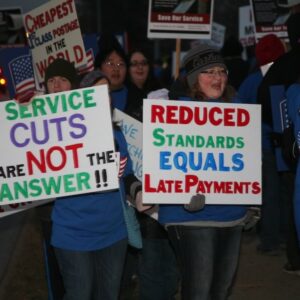March 3, 2026
An Epidemic of Insanity?
(This article appears in the March/April 2014 issue of The American Postal Worker magazine.)
Mike Foster, Motor Vehicle Division Director
Albert Einstein famously defined insanity as doing the same thing over and over again and expecting different results.
So the abuse, fraud, graft and corruption associated with USPS outsourcing makes management’s subcontracting decisions baffling.
Far too often we read reports by the USPS Office of the Inspector General (OIG) that identify alarming problems with subcontracting and contract oversight involving Highway Contract Routes (HCR), the parts program, and the Voyager Card Program. Abuse seems to be rampant.
However, the OIG reports provide only a glimpse of the problems with vendors that are anxious to do business with the Postal Service. It often seems next to impossible to monitor the conduct of the thousands of subcontractors doing postal business.
Questions Beg for Answers
With millions of dollars ripped off from the Postal Service every year, the question that begs to be answered is,“How can this possibly be cheaper than having postal employees perform this work?”
How can the USPS consider outsourcing 162 Postal Vehicle Service (PVS) sites to some of the same contractors that have been investigated and charged by the OIG? How can management continue to subcontract vehicle maintenance work to companies that have been found guilty of fraud and corruption? If the Postal Service eliminates postal employees, how long will it take for subcontractors’ costs to escalate out of control?
A Dec. 18, 2013, report (SM- MA-14-002), Procurement-Related Ethical Violations at Vehicle Maintenance Facilities, found that:
OIG investigations closed during fiscal years (FY) 2009 through 2013 identified 11 instances of VMF employees receiving bribes in exchange for steering work, receiving kickbacks for arranging fraudulent payments to contractors, or concealing personal relationships with suppliers to secure contract work. The Postal Service paid these contractors more than $14.5 million during the period of the violations, which occurred in FYs 2004 through 2012.
An Oct. 30, 2013, OIG Report (NO- MA-14-001), Management Alert-Voyager Card Program for Highway Contract Route – Unidentified and Unrecovered Fuel Overpayment, estimated that:
The Postal Service did not properly identify and recover about $9.9 million in fuel overpayments to HCR suppliers for fuel year 2009-2010. It failed to collect these overpayments because the HCR Voyager Card Program reconciliation process was not reasonably conducted and documented. The OIG previously reported that the estimated value of excess fuel gallons purchased for the 2009-2010 fuel year was $22.5 million. Comparing the OIG’s estimate to the $12.6 million identified resulted in a difference of $9.9 million. We believe additional refunds of overpayments in that amount are due to the Postal Service fromsuppliers.
An Aug. 25, 2008, report (CA- AR-08-009), Contract oversight of Highway Transportation Contracts in the Southeast Area, explained that:
“Officials did not always properly monitor and document contractor performance. Officials could also improve monitoring and controlling costs of canceled segments of highway transportation trips and extra highway transportation trips. We calculated $9,531,082 of unsupported questioned costs due to officials not properly authorizing extra trip costs.”
We’re Cheaper
A 2010 OIG report on Facilities and Engineering Directorate on Vehicle Maintenance Research demonstrated the value of postal employees. (See the chart above, reprinted from the report.)
The report says:
“Vehicle maintenance managers supported keeping maintenance work in- house for the following reasons. Postal Service mechanics develop experience and knowledge as they continually perform work on the same types of vehicles. Whereas commercial garages are not able to achieve the same proficiency as they service a myriad of vehicle types and models. Also the turnover rates at commercial garages can impact timeliness of service. Additionally, Postal Service mechanics are aware of the importance of key features, such as, prop-erly locking doors that a contracted mechanic might not recognize. Finally, Postal Service mechanics are paid a set hourly wage, mitigating the incentive to perform unnecessary work.”
The report urges management to:
“Consider the financial benefits of insourcing. This is a practice used by different companies to reduce costs by transferring portions of work to internal means from suppliers. Canada Post is planning to utilize night shifts at its vehicle maintenance centers to maximize the benefits of insourcing.”
Louisville Study Proves It Too
With such quantitative and qualitative research, it seems insane to contract out postal work. In fact, last November, the MVS Division conducted our own research that supported the premise that postal employees can and should run routes currently run by HCRs.
In Louisville KY the APWU proved that the USPS can save money and preserve postal jobs by combining truck routes currently run by contractors with routes run by PVS employees.
The test was the culmination of a project that collected data over several months and included a full survey of Louisville transportation runs. HCR routes were consolidated with PVS routes using a technique known as “dynamic routing.” PVS drivers were assigned to drive the new dynamic routes, with management observing. Using postal drivers on long-distance trips and other stops currently made by contractors showed that utilizing postal employees can help lower costs and provide savings for the USPS. For their expertise and readily-available assistance in the pilot, I would like to thank Kevin Meyer (Minneapolis Area Local), Michelle Elliot (Chicago Local) and Ramsey Charles (Houston Area Local).
The APWU provided the USPS with the analysis and data, and offered to conduct additional tests in locations where PVS operations don’t currently exist. We expect these tests to further demonstrate that utilizing postal drivers can lower USPS costs and establish good union jobs.
OIG reports, APWU data and local research prove that postal employees are vital to the future of the USPS. Spreading this information will be crucial in our upcoming battles. Let’s stop the insanity.



